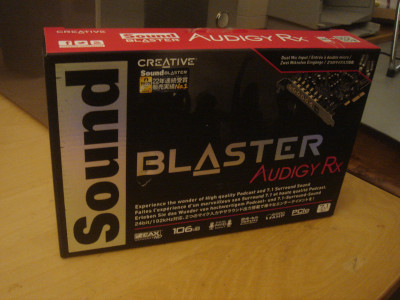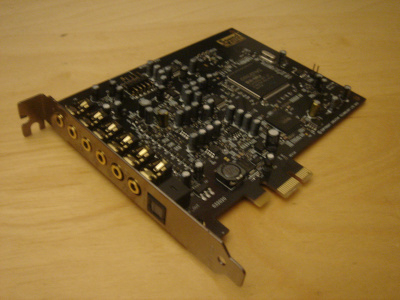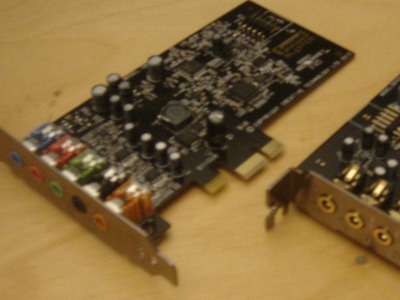Sound Blaster Audigy Rx
14 April 2022After trouble with on-board sound chips the two computer workstations I built in the last year — one for professional work and one for personal stuff — were equipped with Sound Blaster sound cards. In both cases they were the Audigy Fx variant but I later found out that this model does not have any hardware MIDI support, so I ordered in an Audigy Rx that has the
EMU10K1 sound chip that can do hardware MIDI rendition.
While it was nice to hear hardware synthesized MIDI after so many years in short the Rx was a disappointment and I now have doubts over whether I will ever buy another Sound Blaster audio device.

Problems encountered
The Audigy Rx card turned out to to be problematic in many ways and there was only so much time I was prepared to give it before I ripped it out and reinstalled the Audigy Fx it as supposed to replace. Since he Audigy Rx had what is now quite an old sound processing chip I was prepared to cut it a lot of slack, but there comes a point where this slack runs out and this card reached the threshold. At the end of the day the reason I am using a Sound Blaster in the first place is because I want things to Just Work and on this count the Audigy Rx failed miserably.

Scratching when adjusting volume
One thing I quickly noticed is a scratching sound when adjusting the volume in Audacious while a track is playing. While I have had this problem with other systems in the past and was something I was prepared to overlook, it is not a good first impression. It might not actually be the Audigy Rx itself causing it, but these days I am disinclined to dig deep to find out what conflict is causing the problem. I probably could have found a fix but I did not bother since there were more serious issues as well.Adjusting MIDI volume
It was nice to hear sound old Memento Mori music rendered using a hardware sound font but there did not seem to be any way to independently control the volume, at least from the PulseAudio control panel. Not a big issue as my intended use-case was playing something like zDoom which would have a seperate music volume control but it does show a lack of integration of what the EMU10K1 chipset can do into the overall sound control architecture. Again not critical and again could probably find a work-around but certainly annoying.No microphone input
This was the killer — I was unable to get any microphone input working after several hours of Google and messing around with various configuraton tools. I am not sure if it was due to the card not being able to do duplex, a wrong setting somewhere outside of PulseAudio, or perhaps even a faulty card, but in the end I gave up on it after fiddling around with a lot of things such as ALSA settings. Duplex audio is a must since I expect to use this system for video calls, and with the whole point of having a dedicated sound card was to avoid headaches with audio setup it had to go — it might have well been a simple toggle somewhere but I was not prepared to give any more slack.Back to the ‘old’ card
The Audigy Fx actually uses a RealtekALC898 off-the-shelf sound chip which is also used as the on-board chip on many motherboards, but to be fair to Creative they did a good job of making a hardware solution that just works.
Problems with video calls on my professional workstation just vanished when I disabled the on-board sound chip and stuck in an Audigy Fx card, and since avoidance of problems is why I opted for a dedicated sound card in the first place, there is no way the problems getting the Audigy Rx can be justified.
Yes I will miss the hardware EMU10K1 support but compared to something like timidity the hassle is not worth it.

All this makes me wonder whether Creative Labs are de-facto out of the sound card market they used to dominate, as the Sound Blaster Audigy Fx looks like a text-book case of badge engineering. In itself it is a pretty solid product but there is now nothing special about the brand and I've noticed that some vendors have now dropped it completely. I probably should have checked whether the on-board sound chip had any issues before reinstalling the Audigy Fx but for now I am just happy that everything is working properly.
Awful latency
Having reverted back to the Audigy Fx there were problems with exteme latency with audio playback — it was taking a full second before pressing start/stop would actually start or stop playback. I am unsure whether this was a problem for the start or is the result of all the fiddling I did trying to get the Audify Rx working properly. Finding the solution took quite a while and it appears to happen due to having very large buffers, and the parameters that control their size are in/etc/pulse/daemon.conf at lines 87–88:
; default-fragments = 4 ; default-fragment-size-msec = 25
After editing the file to uncomment these lines and adjust their values use killall pulseaudio to terminate the sound daemon— if you have the audio control panel open you will see the daemon getting automatically restarted.
While this was enough to sort out playback
a reboot was needed to sort out recording.
I don't know exactly how fragments map to buffer size but reducing the size from 25ms to 2ms sorted out the awful lag — you might need to use a slightly higher value if other problems are occuring.